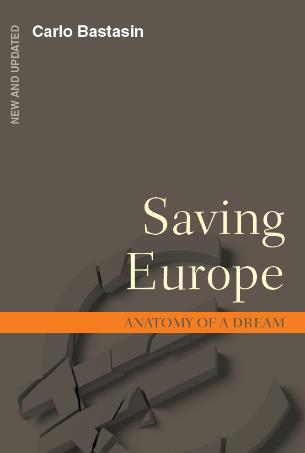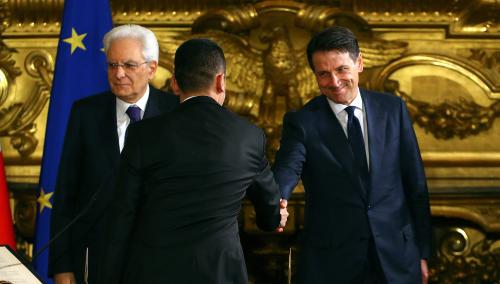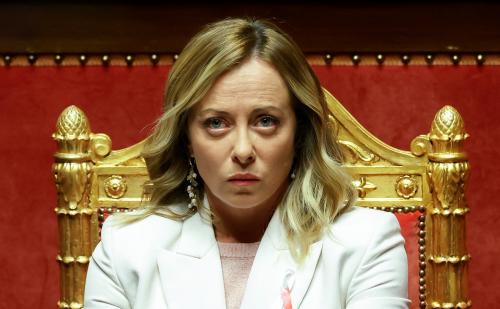Rather than Italy leaving the euro, it’s now that the euros are leaving Italy.
In the recent weeks, after doubts emerged about the government’s will to remain in the European monetary union, Italians have transferred dozens of billions of euros across the borders.
Only a few days after the formation of the new government, the financial situation almost slid out of control. Italy’s liabilities with the euro-area (as tracked by the Target2 payment system) rose by 39 billion euros to a record 465 billion euros in May, largely reflecting capital flight. Swiss monetary authorities detected money flows from across the southern border that were large enough to affect the exchange rate of the Swiss franc with the euro.
In a matter of a few more days—after the new political leaders took a short rhetorical trip to Mars, musing on monetary sovereignty and limitless debts—the financial gravity law brought Italians back to earth. A strong increase in the interest that Italy pays on its huge public debt piled pressure on the new executive. Though more reasonable voices are now prevailing in Rome, it is still too early to say that a financial emergency has been averted. Prime Minister Giuseppe Conte and the guardians of the populist revolution yet to spell out a clear retraction of the original plans to pull Italy away from Europe. More importantly, it is no use denying that the government wants to abandon the euro, while at the same time clinging on to economic policies that are incompatible with Italy staying in the monetary union.
A new government lifeform
Since its conception, the populist DNA of the new government—formed by a coalition between League and Five Star Movement—was genetically modified by the president of the republic, Sergio Mattarella, through his insertion of a few technocrats in critical positions, first of all the finance and the foreign ministries. What came to life was an unprecedented “techno-pop” government. What we are watching now is the internal war between the rational and the irrational sides of the hybrid creature.
On June 10, Finance Minister Giovanni Tria declared in a reassuring interview that he will not deviate from his predecessors’ euro-rigorous fiscal stance. Within hours, during his first G-7 meeting, Prime Minister Conte tried to break loose from Italy’s European bonds on a number of critical issues, from relations with Moscow to trade. In the same day, League’s leader Matteo Salvini denied Italian harbors’ access to a boat carrying 650 migrants who were saved in the Mediterranean. The “techno” and the “pop” are, at a minimum, still out of sync.
My sense is that the big clash has yet to come: On one side, there are political movements legitimated by strong electoral results and a clear parliamentary majority, although obtained through false promises; on the other, a few technocratic figures made “strong” by the fear and fury of financial markets. Populists will say that it is the people vs. finance. The EU must be ready to respond to this claim.
Economic realities
Normally, fiscal discipline would determine the outcome. No populist government has ever thrived without spending public money with largesse. If money is limited, policy choices need to be made according to their consequences. Thus rationality prevails, suffocating populism. The government claims that it wants to reduce Italy’s debt burden and stay in the euro. However, the coalition plans to raise spending, cut taxes, and reverse the pro-growth reforms approved under the past four governments. The described policies would worsen the fiscal position and weaken Italy’s potential growth. With interest rates going up and a possible recession predicted after 2020, the sustainability of Italy’s debt-to-GDP ratio would soon become questionable. Who would buy, today, a three-year government bond maturing after 2020? At the same time, mistaking Italy for Greece and letting a financial crisis do the dirty job would be a fatal error.
Populists will have an easy game claiming that political will needs to prevail on the financial dogma. They’ll emphasize that Italy’s problem is not one of financial weakness. While other euro-countries needed financial assistance, Italy does not depend on net capital imports. It has a current account surplus of 2.8 percent of its GDP, showing an excess of savings over investments. Private wealth is among the highest in the world. About 70 percent of Italy’s sovereign bonds are held at home, including a 20 percent share bought by the Bank of Italy under the European Central Bank’s asset purchase program. Moreover, part of the foreign-held bonds are also in the portfolios of Italian investors. As the recent weeks have shown, market discipline comes from within the country, with Italians ready to run for the door at the first signs of instability, at least until the door is kept open.
Finally, unlike other indebted countries, Italy has a stable primary surplus (the budget surplus without the cost of servicing the debt) and this means that closing capital flows, defaulting on the debt, and losing the trust of the markets would not hamper the functioning of the state. If Greece had no choice but cave in and receive European aid, Italy’s populists may go their way and claim that they want to unshackle the EU’s yoke and follow Plan B. This is an option that the most experienced among the ministers, Paolo Savona, has raised. Ultimately, Plan B hides a trap: Since the plans for exit must be kept secret, no disavowal of the plan is entirely credible.
Wanted: A better European approach
How should Europe relate to the new government? A confrontational strategy is not well advised. Standard arguments about the financial advantages of being in the EU club need to be handled with care. Rome gives more than 3 billion euros more to the EU budget than it gets back, so a EU threat to cut the financial ties would not be convincing. Should Italy violate the fiscal rules, the EU could eventually impose a fine of 0.2 percent of GDP after a lengthy procedure. In fact, a decision about potential penalties would probably not be taken before June 2019, and possibly much later. Finally, the dispute would serve the populist anti-Europe movements well.
On May 23, the EU Commission concluded that Italy had complied with the fiscal rules in 2017.
However, the EU Commission waved a red flag on Italy’s 2018 budget and had strong reservations about its medium-term fiscal plan beyond 2019. According to EU calculations, the structural deficit would widen to 2 percent in 2019 (even taking into account a VAT hike that all political parties resist) instead of narrowing to 0.8 percent of GDP as Rome projects, and as Brussels demands so that Italy can comply with the rule to reduce its debt burden at a sufficient pace. Next September, the government will have to present new estimates and commitments. However, threatening Italy now would be counterproductive for the European institutions. Moreover, it would be superfluous: During the summer, financial markets and rating agencies will keep a close eye on the political developments. A couple of downgradings would be sufficient to cut off Italy’s banks from the European Central Bank liquidity provision, triggering a brutal crisis.
Before this happens, Europe must adopt a new strategy. Since Italy is stuck in the false populist antinomy opposing “people” and “finance,” Europe should adapt its narrative and admit that Italy’s real problem is not “finance,” a slightly higher deficit, or even a debt that struggles to decline. The problem is that the populists’ economic plans are detrimental for Italy’s growth and employment, thus they are ultimately detrimental to the “people.”
The only vital question for Europe is to facilitate the reforms and the investments that Italy needs to restore growth, in return for a sensible fiscal commitment. Sanctioning would be easier than building projects for the EU, just like destroying comes easier than constructing for populists. Europe needs to rise above this existential challenge.
The Brookings Institution is committed to quality, independence, and impact.
We are supported by a diverse array of funders. In line with our values and policies, each Brookings publication represents the sole views of its author(s).







Commentary
“The people vs. finance”: Europe needs a new strategy to counter Italian populists
June 14, 2018